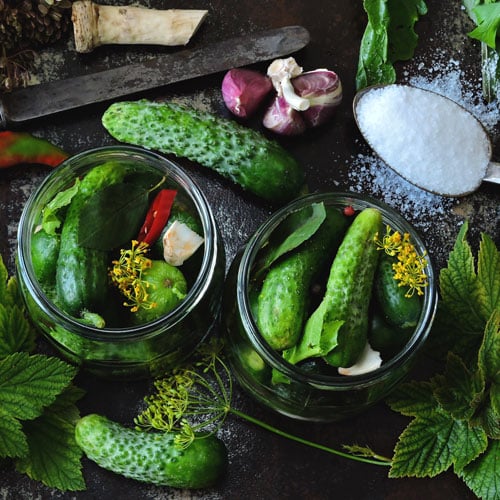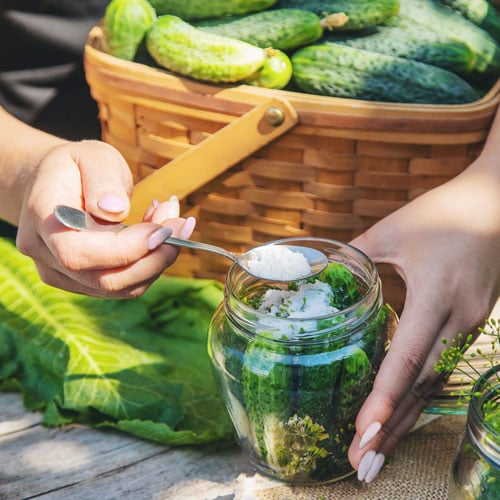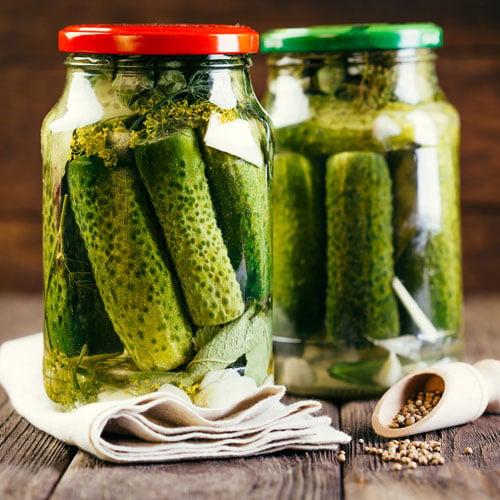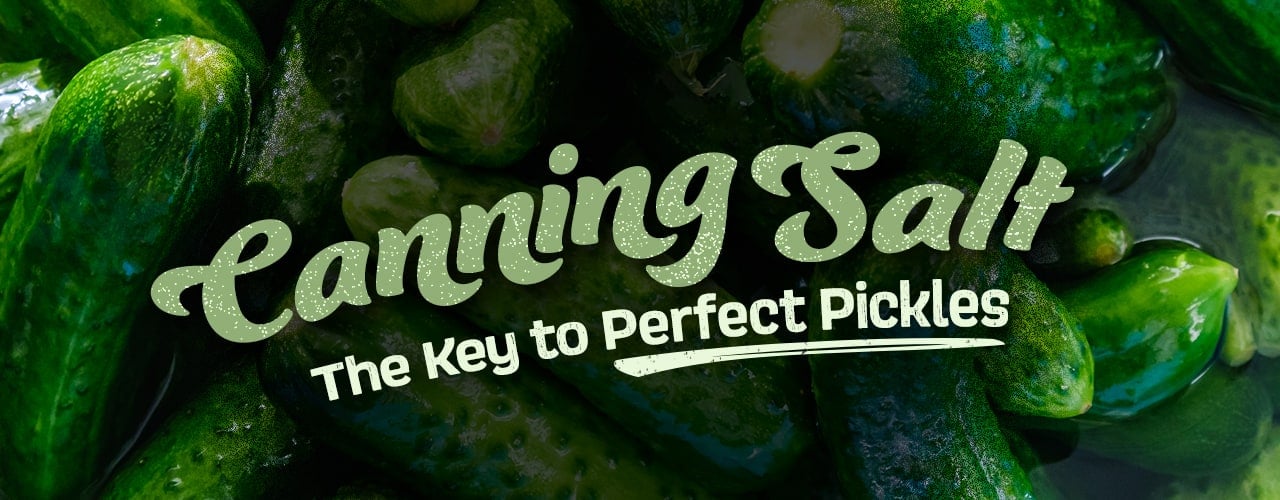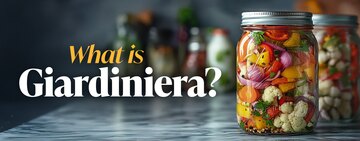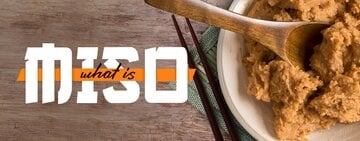Have you ever wondered about the difference between pickling and fermenting? These two food preservation methods have been used for centuries to extend the shelf life of fruits and vegetables. While both techniques create a sour flavor profile, they differ in the way they work and the results they produce. Understanding the nuances between pickling and fermenting can help businesses choose the right method for their food preservation needs. From creating gourmet charcuterie boards to adding tangy elements to your recipes, pickling and fermenting foods can elevate your menu above your competition. Click below to learn more about pickling and fermentation: 1. Pickled vs Fermented 2. What Is Pickling? 3. Types of Pickled Foods 4. What Is Fermentation? 5. Types of Fermented Foods 6. Types of Fermented Drinks 7. Pickling and Fermenting FAQ Is Pickling Fermentation? While both pickling and fermentation are food preservation methods, they are two distinct processes. Watch the video below to understand the distinctions between pickling and fermenting. <iframe itemprop="embedURL" width="560" height="315" src="https://www.youtube.com/embed/cwuo-4Fx-8Q?si=EMOBiYDO8eUAE9pt" frameborder="0" allowfullscreen></iframe> Pickled vs Fermented Fermenting and pickling are two distinct flavoring and preserving processes. Pickling preserves food in a solution of vinegar, salt, and sometimes sugar. Fermentation relies on the naturally occurring bacteria or yeast present in the food or added as a starter culture. During the pickling process, the acidic environment made with added ingredients prevents the growth of bacteria, making the pickled food safe to eat and extending its shelf life. With fermentation, microorganisms consume the sugars in the food and produce lactic acid or alcohol as byproducts. This acidification prevent harmful bacteria from growing, effectively preserving the food. Pickling provides a quick and tangy snack while fermenting is a longer process that results in a sour flavor profile that is unique to each batch. What Is Pickling? Pickling is a centuries-old food preservation method that involves immersing food items in a solution of vinegar, water, and pickling salt. Optional pickling brine ingredients can be added, like flavor-enhancing pickling spices, sugar, or aromatics (fresh herbs, citrus rinds, and garlic). Pickling not only extends the shelf life of food but also imparts tang and flavor. While we often associate pickling with cucumbers, there are many different types of pickles to choose from. What Is Pickling Salt? Pickling salt, also known as canning salt or preserving salt, is a finely ground salt with zero additives, specifically designed for pickling and canning purposes. The absence of additives, like iodine or anti-caking agents found in table salt, ensures that the flavors, colors, and textures of the fruits and vegetables are not altered during the pickling process. The fine grains easily dissolve in water, allowing for a quick and even distribution of salt throughout the brine. Types of Pickled Foods With a wide range of delicious options to choose from, here are some of the most common pickled foods you may encounter to add to your menu: Pickled Vegetables: Pickled vegetables are the most popular ingredient to preserve through this process. Firm vegetables, like cucumbers, beets, carrots, cauliflower, scallions, and onions, are best for pickling, while vegetables like leafy greens do not hold up well in the brine. Giardiniera, a popular Italian condiment made from an assortment of pickled vegetables, is perfect for topping sandwiches and hot dogs. Pickled Fruits: Pickling fruit is a great way to add a sweet and sour element to a dish. Mangoes, strawberries, cherries, plums, peaches, pears, apples, and grapes are great fruits for pickling because of their firm structure. The acidic brine helps to soften the fruit and add brightness to the flavor. Include aromatic ingredients like mint and citrus rinds to complement the sweet fruits. Pickled Eggs: Pickled eggs are popular in the U.K., Germany, and Pennsylvania Dutch cuisine. Place hard-boiled eggs into a glass jar and top them with pickling liquid, herbs, and garlic. Beet juice can be added to give the eggs a vibrant pinkish-purple color and sweet, earthy flavor. Pickled Meat: Pickling meat is an excellent way to preserve specialty meats and lend a new, distinct flavor. Ideal meats to pickle are sausages, knockwursts, bologna, kielbasa, beef, and ham. Pickled Fish: Pickled fish is a delicacy in Russia, Eastern Europe, and parts of Scandinavia. The most popular pickled fish is pickled herring, followed by firm white fish like perch and walleye. What Is Fermentation? Fermentation is a natural metabolic process in which microorganisms, such as bacteria or yeast, convert sugars into acids, gases, or alcohol. This acidification or alcohol production creates an environment that is inhospitable to harmful bacteria. The metabolic activity of microorganisms during fermentation creates the characteristic sour or umami flavors found in fermented foods. Fermentation offers several benefits beyond preservation. It can enhance the nutritional value of food by increasing the availability of certain vitamins and minerals. For example, fermented vegetables like sauerkraut and kimchi are rich in probiotics, which are beneficial for gut health. Fermentation also breaks down complex molecules, making the nutrients more easily digestible. Types of Fermentation There are three types of fermentation: lactic acid fermentation, alcoholic fermentation, and acetic acid fermentation. Lactic Acid Fermentation: Lactic acid fermentation uses water, salt, and the naturally occurring sugars found in the food to change the starches and sugars into acid. Lactic acid-producing bacteria are essential for creating kimchi, sauerkraut, and yogurt. Alcoholic Fermentation: Alcoholic fermentation is a natural process where yeast converts sugars into alcohol and carbon dioxide. This process is commonly used to make beer, wine, and spirits. During alcoholic fermentation, yeast, whether naturally occurring or cultivated, breaks down sugars present in the ingredients, releasing alcohol as a byproduct. Acetic Acid Fermentation: Acetic acid fermentation requires a SCOBY (symbiotic combination of bacteria and yeast) or other starter culture made up of living organisms. The acetic acid fermentation method is used to create kombucha, sourdough, kefir, ginger beer, and apple cider vinegar. Types of Fermented Foods Fermented ingredients can be used to add depth and complexity to dishes. These are some of the most popular fermented foods your customers might enjoy: Sourdough: Bread leavened with bacteria and naturally occurring yeast, sourdough bread features a characteristic sour flavor and chewy texture because of fermentation. Kefir: A fermented milk drink made with kefir grains, kefir has a tangy flavor and slightly fizzy consistency. It can be enjoyed on its own or used as an ingredient in smoothies, salad dressings, and baked goods. Vinegar: Vinegar is made through a two-step fermentation process that converts alcohol into acetic acid, giving it a distinct sharp flavor. Kimchi: Kimchi is a traditional Korean condiment made by fermenting vegetables, most commonly cabbage, with a combination of spices and seasonings. It has a spicey flavor that is perfect for soups, stews, stir-fries, and even topping burgers and tacos. Sauerkraut: A beloved staple in German cuisine, sauerkraut is a type of fermented cabbage made through the lactic acid fermentation process. Tempeh: Tempeh is a traditional Indonesian food made from soybeans that have been fermented and formed into a cake-like patty, making it an excellent source of plant-based protein. This fermentation gives tempeh its unique nutty flavor and firm texture. Yogurt: Yogurt is made by fermenting milk with live bacteria cultures, specifically Lactobacillus bulgaricus and Streptococcus thermophilus. During the fermentation process, these bacteria convert lactose, the natural sugar in milk, into lactic acid, which gives yogurt its signature flavor. Lacto fermented pickles: Lactic acid fermented pickles are made through a natural fermentation process that involves the growth of beneficial bacteria called lactobacillus. This bacterial produces lactic acid, which gives the pickles their distinct texture and unique sour flavor that isn’t acidic like traditional pickles. Miso: Miso is a staple ingredient in Japan that's made from fermented soybeans that are ground into a paste. It is commonly used in soups, marinades, dressings, and even desserts for its umami taste and distinct aroma. Types of Fermented Drinks Food isn't the only thing that can be fermented. There are many types of fermented drinks that you can add to your beverage list: Ginger Beer: Ginger beer is a non-alcoholic, bubbly drink made from fermented ginger, yeast, and sugar; perfect for making mocktails, like this blackberry mule mocktail Wine: Wine is an alcoholic drink traditionally made from fermented grapes Beer: Beer is an alcoholic beverage made from yeast, hops, malt, and other cereal grains Kombucha: Kombucha is a fizzy beverage made from tea, yeast, sugar, and bacteria Hard Cider: Hard cider is an alcoholic beverage made from fermented apples Mead: Mead is an alcoholic drink made from honey, water, and yeast Sake: Sake is an alcoholic beverage made from bran-removed rice Pickling and Fermenting FAQ We answer some frequently asked questions about pickling and fermenting foods below: Are Pickles Fermented? Quick pickles, the most common type of pickle found in grocery stores, are not fermented because they use an acid, such as vinegar, in their pickling brine. However, lacto fermented pickles are fermented because they follow the lactic acid fermentation method, which only uses water and salt in its brine. Is Vinegar Fermented? Vinegar is fermented using two fermentation processes: alcoholic fermentation and acetic acid fermentation. To start the process of fermenting vinegar, the yeast will consume the natural sugars. This process will excrete alcohol, causing alcoholic fermentation. Next, oxygen is fed to the alcohol, which causes bacteria to grow and produce acid, undergoing the acetic acid fermentation process. How Long Do Pickled Foods Last? Fresh pickled foods can last upwards of 75 days when unopened and stored in the fridge. Once opened, it's important to store any remaining pickles in the fridge, submerged in brine, to maintain freshness. According to the USDA, pickles stored this way can stay fresh for at least up to three months. Canning vs Pickling Canning and pickling are two popular methods of food preservation that serve different purposes. Canning involves sealing food in airtight containers and typically uses heat to kill bacteria, ensuring long-term shelf stability. Pickling is a process that involves submerging food in a brine solution to encourage the growth of beneficial bacteria, creating a tangy flavor. While canning is ideal for preserving fruits and vegetables for extended periods, pickling is more about enhancing flavor and texture, especially with items like cucumbers, onions, and peppers. What Are Probiotics? Probiotics, often found in fermented foods, are living microorganisms that are consumed for their benefit to the human body. They are considered “good” bacteria that can aid with digestion or help to replace organisms that are lost after you take antibiotics. Not all microorganisms that are found in foods are probiotic. For example, yeast helps baked goods rise and plays a key role in fermenting beverages like beer and wine, but most strains of yeast are not probiotic. Do Fermented Foods Contain Probiotics? Not all fermented foods contain probiotics. While some fermented foods, such as yogurt, kefir, and sauerkraut, are rich in probiotics that promote gut health, not every fermented product undergoes the same process to cultivate beneficial bacteria. It is essential to choose fermented foods that are specifically labeled as containing live and active cultures to ensure you are consuming probiotics along with the unique flavors and textures that fermentation offers. Does Heat Kill Probiotics? Some fermented foods lose their probiotic organisms as a result of heat treatment. Canned sauerkraut and canned kimchi, two foods that contain probiotics when not canned, are put under heat as part of the canning process. Often, this heat deactivates the probiotics found in these foods. Cooking foods with probiotics can do the same, though some experts argue that even deactivated probiotics can have positive effects on the human body. If you want to give your customers the full benefits of these kinds of good bacteria, it’s best to serve probiotic-full foods at room temperature or cooler, but not frozen. Whether you're looking to create pickles with a crisp texture or ferment vegetables for their probiotic benefits, understanding the nuances of these preservation techniques can elevate your culinary creations. Now that you know the difference between fermenting and pickling, you can create your own pickled and fermented foods in your restaurant’s kitchen and draw in customers with these unique and flavorful menu additions.
